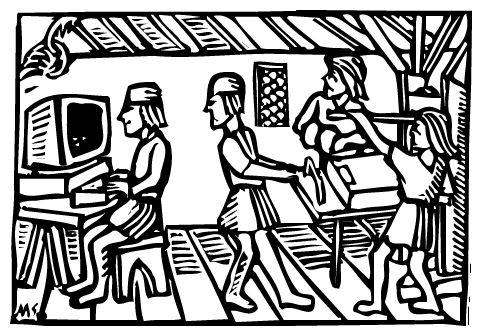
Haver Tales and Bryn Marvels is an adaptation project created by the students of Sarah Watson’s ENG 201 class at Haverford College. The project aims to collect and share student adaptations of Geoffrey Chaucer’s The Canterbury Tales (c.1400). The portraits, prologues, and tales collected here are as diverse as Chaucer’s pilgrims, presenting A Capella singers, Pre-Med students, Nerds and Lacrosse Players, and ranging in form from poetry to music to visual arts. Many of the adaptations seek to bring Chaucer’s text into dialogue with current social and political conversations, deftly collapsing the distance between medieval and modern.
The adaptations are arranged under the sections of The Canterbury Tales which they adapt. Projects that engage with The Canterbury Tales as a whole are included under an additional tab. Each subsection is headed with a summary and a quotation from Chaucer’s Middle English text to give a flavor of the medieval text being adapted. All items have been shared with student permission.
The project will expand year by year and serve as a creative space and a pedagogical resource.
Geoffrey Chaucer, born in 1343, was a diplomat, royal servant, and controller of customs as well as a prolific writer. Chaucer began his final work, The Canterbury Tales, in around 1386 and left the text unfinished when he died in 1400. The Canterbury Tales employs a frame narrative which describes a group of pilgrims travelling to Canterbury Cathedral to visit the shrine of Thomas Beckett. Along the way, the pilgrims tell stories to pass the time. They also agree to award the best tale-teller with a free dinner.
ENG 201: Chaucer – The Canterbury Tales, sets Chaucer’s well-known text in dialogue with modern adaptations. We read Patience Agbabi’s Telling Tales (2015), a full-length adaptation of The Canterbury Tales and engage with texts and short films inspired by specific prologues and tales, such as Jean ‘Binta’ Breeze’s “The Wife of Bath in Brixton Market”(2000) and the animated “Wife of Bath’s Tale”(1988) by Joanna Quinn. Students are also asked to prepare a short presentation on an additional adaptation and are encouraged to explore adaptations in multiple languages and mediums using the online resource “Global Chaucers.”